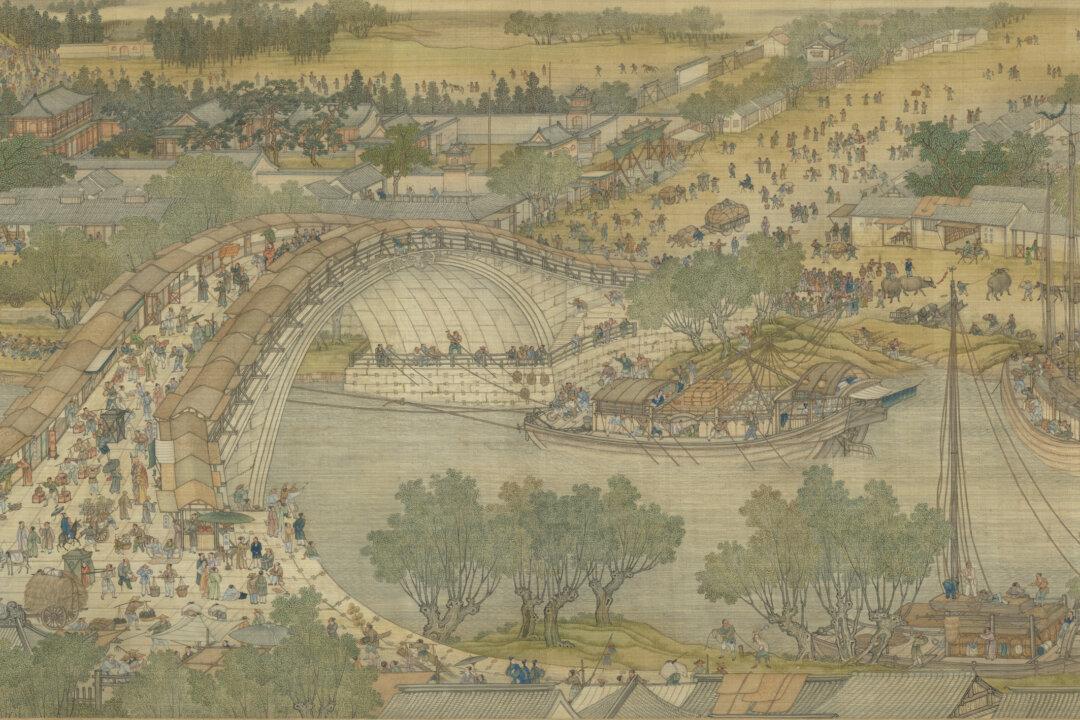On Sept. 8, Chinese people around the world will celebrate the Zhongqiu Jie (中秋節), also known as the Mid-Autumn Festival. It always falls on the 15th day of the 8th month in the lunar calendar.
It is an important occasion for family members to get together to admire the full and bright harvest moon and to enjoy eating mooncakes.
While the festival is most often associated with the legend of Chang E, since ancient times, the mid-autumn moon has also been a source of inspiration for Chinese poets. Through poetic verse about this moon, they expressed their joys and sorrows, ups and downs, homesickness and hopes.
Li Bai, Du Fu, Bai Juyi, and Su Shi are among the prominent poets in Chinese literature who have dwelled on this oft-time melancholy moon.
Poetry by Li Bai
Li Bai (701–762 A.D.) was a poet from the Tang Dynasty. He has been regarded as the “immortal” poet in Chinese literary history.
When he was young, Li Bai loved to read. By the age of 10, he had already read many Confucian classics.
In his mid-20s, Li Bai left home, wandering the countryside until 742 A.D., when he settled down to serve Tang Emperor Xuanzong (1) by providing scholarly expertise and poetry.
One day, while taking a walk and enjoying the flowers in the palace garden with his favorite royal consort, Yang Guifei (2), the emperor had an uplifting mood. He sent someone to fetch Li Bai to the palace to write lyrics for their moment.
Li Bai came, drunk, and had difficulty standing still before the emperor. The courtiers were obliged to splash water in his face to wake him up. Li Bai recovered a little, seized a brush, and effortlessly wrote a composition of flawless grace.
The emperor was very pleased and impressed with Li Bai’s talent. After that, whenever he was feasting or drinking, the emperor had Li Bai as a companion.
Once when he was drunk, Li Bai got his shoes dirty. The emperor ordered the eunuch, Gao, to clean Li Bai’s shoes. Gao was the most influential eunuch in the palace and he served only the emperor. He was very offended by being asked to do such a lowly task as to clean someone else’s shoes. However, he had to follow the emperor’s order.
The eunuch took revenge by provoking discord in the relationship between Li Bai and Yang Guifei. He showed Yang one of Li Bai’s poems and told her it was a veiled attack on her.
Because she trusted the eunuch, Yang became angry with Li Bai. The eunuch and the consort convinced the emperor that it was inappropriate to have Li Bai in the palace. Li Bai was finally sent away from the royal court in 743 A.D.
After leaving the palace, Li Bai started wandering again and continued writing poems. It was said he became a Daoist. On an autumn day in the year after his exile, he encountered another poet of the time, Du Fu. Admiring each other’s literary talent, they immediately became good friends.
In his poems, Li Bai expressed his great passion for nature, his love of the country, and the sorrow in his heart. Most of his poems portray humanity as lost, lonely, and yearning for a connection with Heaven. Below are two famous poems that he wrote about the moon (the poems that follow are the primary author’s interpretations).

“Drinking alone with the moon“ is a poem by Li Bai who was regarded in China as the ”immortal” poet. (Xiao Yun/Epoch Times)
Drinking alone with the moon From a pot of wine, among the flowers,I drank alone with no companion.Raising the cup, I asked the bright moon,Bring me my shadow and make us three.The moon cannot understand my drinking,My shadow follows silently wherever I go.The moon temporarily accompanies the shadow,I take the opportunity to have a joyous time.Moonlight wanders around when I sing,The shadow floats along when I dance.Enjoying the friendship while I am awake,The companionship ends while I am drunk.Let’s have friendship forever,We will meet again in the vast sky. Still night thoughts The moon is shining bright in front of my bed,I took it for frost upon the ground.Raising my head, I see the bright moon,Bowing my head, I long for home.Notes:
- Emperor Xuanzong (685–762 A.D.), also called Emperor Minghuang of Tang, was the seventh emperor of the Tang Dynasty. His personal name was Li Longji and he reigned for 43 years (712-756), which was the longest of the Tang era. He, through astute governance, is said to have brought Chinese culture and power to its peak.
- Yang Guifei’s personal name was Yang Yuhuan (719–756 A.D.). The rank, guifei is the highest for imperial consorts after the empress. During his later years, Yang became Emperor Xuanzong’s most beloved consort. She is also known as one of the Four Beauties of ancient China.




